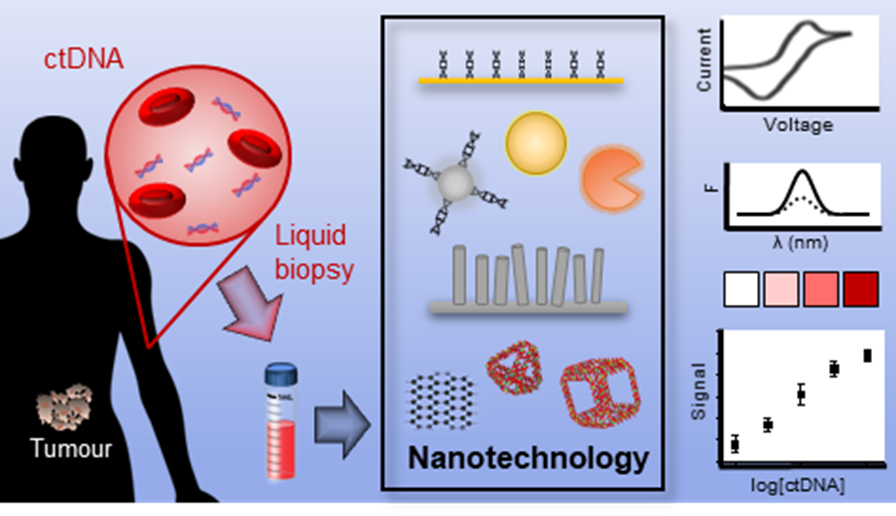Together with our industrial partners at CITRE (A Bristol Myers Squibb company) and our collaborator in the Queen’s Medical Research Institute, we have just published a systematic review on the use of nanotechnology for quantification of circulating tumour DNA (ctDNA) in liquid samples such as blood. The paper was formally published in IEEE Reviews in Biomedical Engineering.

Treating cancer is very difficult because the efficacy of any therapy will vary from patient to patient. It is therefore essential to monitor whether a tumour is responding to therapy, to inform decisions at the point-of-care. Technologies that improve the quantification of tumour-derived DNA in body fluids have the potential to revolutionise patient care by enabling real-time measurements of cancer progression in a non-invasive manner.
The gold standard for ctDNA analysis is sequencing, but this is too complex and time-consuming for regular clinical use. Nanotechnology could offer a route to new methods of quantification.
In our new paper, we examine the state of the art in this area. By adopting a systematic methodology, we searched the literature exhaustively to identify all relevant technologies. We found that most technologies are in a comparatively early stage of development, with a great deal of further work being required to prepare them for clinical use. We expect that there will be trade-offs between different performance measures, but our searches suggest that nanotechnology is a promising approach for new ctDNA diagnostics as many researchers have demonstrated impressively sensitive detection systems.
The first author of the paper is PhD student Nathan Wu, whose research is funded by CITRE (a Bristol Myers Squibb company) and the Scottish Research Partnership in Engineering under the Industry Doctorate programme. The work was supervised by Dr Katherine Dunn. The other authors are Matthew Aquilina (also a PhD student in Katherine Dunn’s research group, funded by the MRC Doctoral Training Programme in Precision Medicine); Dr Bin-Zhi Qian (an expert on cancer metastasis, based at The Queen’s Medical Research Institute); Dr Remco Loos and Dr Ines Gonzalez-Garcia (both scientists at CITRE); Dr Cristina Costa Santini (formerly a scientist at CITRE, now with Roche).
Read the full paper here: https://ieeexplore.ieee.org/document/9737698


